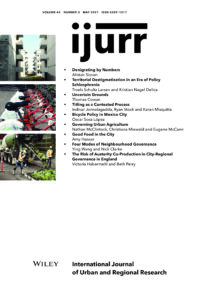In a context of global moves towards decentralization and neighbourhood governance, this article focuses on neighbourhood governance in Nanjing, China. We draw on interviews and observations in 32 neighbourhoods to examine how neighbourhood governance plays out in different neighbourhoods. We identify and describe four modes of governance—collective consumption, service privatization, civic provision and state‐sponsored—to argue that neighbourhood governance develops on the ground in diverse and complex ways, necessitating scholars to be cautious when seeking to generalize about it at the scale of the city, let alone that of the nation‐state or the globe. We argue that relationships between actors are important units of analysis when considering how effective governance is achieved in different neighbourhoods; diversity and complexity in neighbourhood governance partly reflect the role of the state in these relationships. In turn the role of the state partly reflects processes of policy evolution in particular neighbourhoods.
Details
Written by:
Ying Wang & Nick Clarke
Digital Object Identifier (DOI)
10.1111/1468-2427.12983
About DOI

